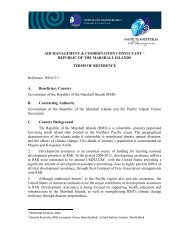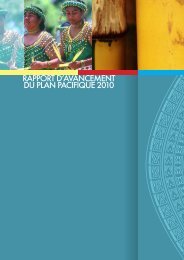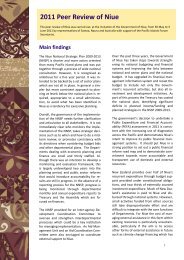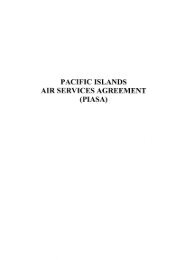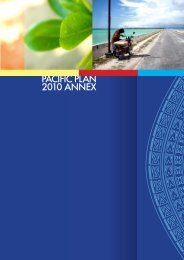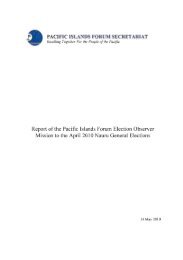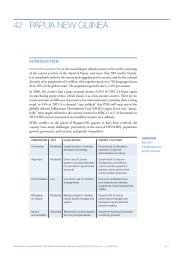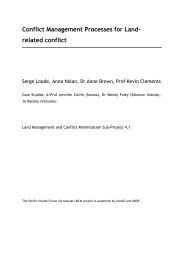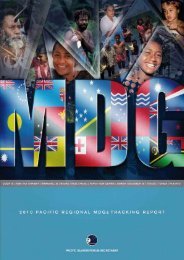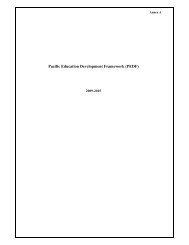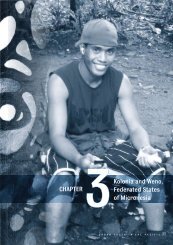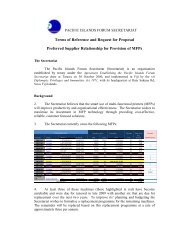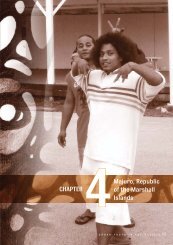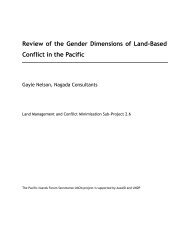Fast Tracking the Training of Untrained Teachers - Pacific Islands ...
Fast Tracking the Training of Untrained Teachers - Pacific Islands ...
Fast Tracking the Training of Untrained Teachers - Pacific Islands ...
You also want an ePaper? Increase the reach of your titles
YUMPU automatically turns print PDFs into web optimized ePapers that Google loves.
PACIFIC ISLANDS FORUM SECRETARIAT<br />
FORUM EDUCATION MINISTERS’ MEETING<br />
Crown Plaza Hotel, Port Moresby, Papua New Guinea<br />
13 - 14 October 2010<br />
SESSION SIX<br />
PIFS(10)FEDMM.07<br />
FAST TRACKING THE TRAINING OF UNTRAINED TEACHERS<br />
IN THE PACIFIC REGION<br />
This paper was prepared by <strong>the</strong> University <strong>of</strong> <strong>the</strong> South <strong>Pacific</strong> proposing a strategy for fasttracking<br />
<strong>the</strong> training <strong>of</strong> un-trained teachers in <strong>the</strong> region.
Purpose<br />
PACIFIC ISLANDS FORUM SECRETARIAT<br />
FORUM EDUCATION MINISTERS’ MEETING<br />
Crown Plaza Hotel, Port Moresby, Papua New Guinea<br />
13 - 14 October 2010<br />
2<br />
PIFS(10)FEDMM.07<br />
FAST TRACKING THE TRAINING OF UNTRAINED TEACHERS<br />
IN THE PACIFIC REGION<br />
To present USP’s initiative to fast track <strong>the</strong> training <strong>of</strong> untrained teachers in <strong>the</strong> <strong>Pacific</strong><br />
for consideration <strong>of</strong> <strong>the</strong> Forum Education Ministers. The full text <strong>of</strong> <strong>the</strong> USP initiative is<br />
contained in Attachment 1 to this paper.<br />
Background<br />
2. Preliminary surveys indicate that <strong>the</strong> potential number <strong>of</strong> untrained teachers in <strong>the</strong><br />
<strong>Pacific</strong> island countries is substantial and constitutes a significant challenge for USP and <strong>the</strong><br />
o<strong>the</strong>r higher education institutions in <strong>the</strong> region. The School <strong>of</strong> Education (SOE) at USP can<br />
fast track training by <strong>of</strong>fering certificates <strong>of</strong> education for primary and secondary teachers,<br />
modified and delivered directly for identified cohorts <strong>of</strong> students or taught in conjunction<br />
with national institutions in <strong>the</strong> region to provide initial certification.<br />
3. Both certificates consist <strong>of</strong> eight courses plus practicum. The practicum will be related<br />
to each <strong>of</strong> <strong>the</strong> courses and undertaken in a teacher’s own classroom. The primary teachers’<br />
certificate would consist <strong>of</strong> courses specially designed for teachers in <strong>the</strong> areas <strong>of</strong> teaching<br />
methodologies, ma<strong>the</strong>matics, science, social science, a local language, language, English for<br />
academic purposes, and application <strong>of</strong> <strong>the</strong> knowledge and skills in <strong>the</strong>ir classrooms. The<br />
secondary teachers’ certificate would consist <strong>of</strong> two courses in teaching subjects, a local<br />
language, issues in teaching and learning, language for teachers, principles <strong>of</strong> assessing<br />
student performance, English for academic purposes, communication and information literacy<br />
and application <strong>of</strong> <strong>the</strong> knowledge and skills in <strong>the</strong> classroom.<br />
4. These programs would provide an alternative pathway for untrained teachers to<br />
upgrade <strong>the</strong>ir teaching skills and curriculum content knowledge and <strong>the</strong>n be eligible to enter<br />
<strong>the</strong> Bachelor <strong>of</strong> Education in-service degree program. The certificate programs would be <strong>the</strong><br />
first part <strong>of</strong> a stair-casing approach to facilitate access for untrained teachers to <strong>the</strong> BEd<br />
program.
Progress to date<br />
5. Discussion has occurred with <strong>the</strong> relevant authorities in Kiribati and Solomon <strong>Islands</strong><br />
on how to fast track <strong>the</strong> training <strong>of</strong> untrained primary and secondary teachers. Various<br />
alternatives have been considered such as <strong>of</strong>fering <strong>the</strong> programs face to face, by distance and<br />
online as well as by cohort with suggested timelines. A proposal was presented to AUSAID<br />
for funding to train untrained primary teachers in <strong>the</strong> Solomon <strong>Islands</strong>. Based on <strong>the</strong> progress<br />
<strong>of</strong> this submission, USP plans to <strong>of</strong>fer <strong>the</strong> program region-wide. In addition <strong>the</strong> certificate<br />
courses at USP are being modified. Discussions are taking place with Ministries <strong>of</strong> Education<br />
to determine how to best progress this initiative in a strategic way.<br />
Modes <strong>of</strong> <strong>of</strong>fering<br />
6. A student could take one or two courses per semester. The courses could be taught<br />
directly by USP or as joint ventures between USP and teacher training institutions in <strong>the</strong><br />
region. Local teacher training institutions could provide facilities and support tutors to work<br />
with <strong>the</strong> USP lecturers in delivering <strong>the</strong> courses. Some work can be done directly from USP<br />
online on Moodle platform or through print and o<strong>the</strong>r electronic means. It could also be<br />
<strong>of</strong>fered face to face in country.<br />
7. Depending on <strong>the</strong> mode <strong>of</strong> <strong>of</strong>fer and need, a student could complete <strong>the</strong> whole<br />
program in primary or secondary teaching in one year if studying fulltime doing four courses<br />
a semester or over two years if doing two courses a semester. But timing may vary depending<br />
on <strong>the</strong> combination <strong>of</strong> study <strong>the</strong> student chooses.<br />
Proposed timeline<br />
8. For <strong>the</strong> primary teachers’ certificate program it is proposed to begin in 2011 with <strong>the</strong><br />
<strong>of</strong>fer <strong>of</strong> <strong>the</strong> courses face to face/summer school and using Moodle platform with follow up<br />
practicum. For <strong>the</strong> secondary teachers’ certificate program, it is also proposed to begin in<br />
2011 by country or region-wide depending on needs <strong>of</strong> <strong>the</strong> countries.<br />
Outcomes<br />
9. The outcomes for both <strong>the</strong> primary and secondary teachers’ certificate programs<br />
would be that teachers will be equipped with <strong>the</strong> basic knowledge and skills required to teach<br />
effectively in <strong>the</strong>ir classrooms and thus improving <strong>the</strong> quality <strong>of</strong> education.<br />
Issues<br />
10. Fur<strong>the</strong>r work is necessary to be done in <strong>the</strong> following:<br />
obtaining recent figures <strong>of</strong> untrained teachers in each Forum member country;<br />
working with countries to determine priorities;<br />
developing course materials;<br />
obtaining support <strong>of</strong> Ministries, schools and principals;<br />
considering incentives for teachers upon graduation;<br />
identifying funding sources to deliver <strong>the</strong> programs.<br />
3
Recommendations<br />
11. Ministers are invited to:<br />
(a) note <strong>the</strong> details <strong>of</strong> <strong>the</strong> proposal <strong>of</strong> <strong>the</strong> USP initiative to train untrained teachers<br />
in <strong>the</strong> <strong>Pacific</strong> region contained in Attachment 1; and<br />
(b) consider and support <strong>the</strong> proposal for fur<strong>the</strong>r development and<br />
implementation.<br />
<strong>Pacific</strong> <strong>Islands</strong> Forum Secretariat, Suva<br />
21 September 2010<br />
4
Preamble<br />
USP INITIATIVE TO TRAIN UNTRAINED TEACHERS<br />
IN THE PACIFIC REGION<br />
5<br />
Attachment 1<br />
This paper is concerned with <strong>the</strong> training <strong>of</strong> untrained teachers by USP in <strong>the</strong> <strong>Pacific</strong><br />
region. We are aware that teacher training and supply remains a significant problem for most<br />
countries in <strong>the</strong> <strong>Pacific</strong> region. The School <strong>of</strong> Education believes that upgrading <strong>the</strong> skills <strong>of</strong><br />
untrained teachers will help address <strong>the</strong> challenges facing <strong>the</strong> <strong>Pacific</strong> island nations,<br />
especially those without teacher training institutions, and improve education for children in<br />
<strong>the</strong> region. <strong>Teachers</strong> would gain initial skills, knowledge and certification through an eight<br />
course certificate <strong>of</strong>fered by <strong>the</strong> School <strong>of</strong> Education at USP.<br />
2. This proposal is consistent with <strong>the</strong> vision, mission and priority areas <strong>of</strong> <strong>the</strong> University<br />
<strong>of</strong> <strong>the</strong> South <strong>Pacific</strong>. The vision 1 <strong>of</strong> USP is to:<br />
be proactive in recognizing and meeting <strong>the</strong> higher education needs,<br />
deliver quality learning and teaching, research and hence quality in all university<br />
services,<br />
be highly regarded locally, regionally and internationally, and<br />
provide relevant and sustainable solutions across <strong>the</strong> spectrum <strong>of</strong> contemporary<br />
challenges in <strong>the</strong> <strong>Pacific</strong>.<br />
Background<br />
3. The focus <strong>of</strong> <strong>the</strong> School <strong>of</strong> Education (SOE) at USP is to provide quality teacher<br />
education and pr<strong>of</strong>essional development throughout <strong>the</strong> region. USP has a suite <strong>of</strong><br />
certificates, diplomas, degrees and post graduate programs that are <strong>of</strong>fered to train teachers.<br />
These can be taught by a mix <strong>of</strong> modes such as; face to face, print, Moodle online support for<br />
face to face, fully online, blended modes and summer/winter schools. The most likely mode<br />
<strong>of</strong> <strong>of</strong>fering <strong>of</strong> <strong>the</strong> certificate would be to cohorts on USP campuses, or those <strong>of</strong> local teacher<br />
education institutions, with <strong>the</strong> assistance <strong>of</strong> local experts and online or print materials for<br />
support. Completion <strong>of</strong> a certificate can <strong>the</strong>n lead to enrolments in relevant Diplomas and<br />
Degrees.<br />
4. A preliminary desk review carried out by <strong>the</strong> <strong>Teachers</strong> and Education in <strong>the</strong> <strong>Pacific</strong><br />
(TEP) Project in 2007 (Fua & Sanga, 2007) 2 presented issues on teachers and teacher<br />
education in <strong>the</strong> region including information on <strong>the</strong> status <strong>of</strong> teacher demand, supply and<br />
deployment and work environment. This included some statistics for untrained teachers in<br />
Fiji, Kiribati, Nauru, Niue, PNG, Marshall <strong>Islands</strong>, Samoa, Solomon <strong>Islands</strong>, Tonga, Tokelau,<br />
Tuvalu and Vanuatu. This was as follows:<br />
• about 40 % <strong>of</strong> teachers in Tonga and more than 30 % in <strong>the</strong> Solomon <strong>Islands</strong> were<br />
uncertified or untrained.<br />
• <strong>the</strong> problem was not serious in Fiji (.06%), Samoa (4%), Cooks (7%) and Niue.<br />
1 USP Strategic Plan 2010 - 2012<br />
2 Fua, S.J & Sanga, K.F. (2007) <strong>Teachers</strong> and Education in <strong>the</strong> <strong>Pacific</strong> (TEP): A desk study report,<br />
Commissioned by AusAID-ADB.
• Information on untrained teachers was not available from Kiribati, Nauru, Tokelau,<br />
Tuvalu and Vanuatu in <strong>the</strong>ir study.<br />
• PNG also had some untrained teachers but data were not available.<br />
5. Some recent data on untrained teachers have been obtained as follows but some <strong>of</strong><br />
<strong>the</strong>se are un<strong>of</strong>ficial and updated information is still being obtained.<br />
Country Per cent (%) <strong>Untrained</strong> Number untrained<br />
Cook <strong>Islands</strong> 3 20 ECE<br />
1.7 Primary<br />
7.7 Secondary<br />
Fiji 4 Secondary 120<br />
Kiribati 5 65 Senior Secondary<br />
84 Junior Secondary<br />
15 Primary & Junior Secondary<br />
Marshall <strong>Islands</strong> 6 65<br />
Nauru<br />
Niue<br />
6<br />
181<br />
53<br />
88<br />
Solomon <strong>Islands</strong> 7 45 About 3256<br />
Tokelau 8 About 50 About 58<br />
Tonga 9 20 Secondary About 200<br />
Tuvalu 10 About 25<br />
Vanuatu 11 27 Primary<br />
34 Secondary<br />
6. Even from <strong>the</strong>se approximate numbers, it can be seen that <strong>the</strong>re is potentially a very<br />
large number <strong>of</strong> untrained teachers in <strong>the</strong> region which constitutes a problem for <strong>the</strong> quality<br />
<strong>of</strong> education and poses a significant challenge for USP and <strong>the</strong> o<strong>the</strong>r education institutions in<br />
<strong>the</strong> region.<br />
Progress to date<br />
3 USP Campus Director<br />
4 MOE 2010<br />
5 Digest <strong>of</strong> Education Statistics 2008<br />
6 Un<strong>of</strong>ficial communication<br />
7 MOE 2009 (estimated), confirmed by USP Campus Director<br />
8 PRIDE<br />
9 MOE 2009<br />
10 MOE 2010<br />
11 USP Campus Director<br />
905<br />
457
7. Discussion has occurred with <strong>the</strong> relevant authorities in Kiribati, and Solomon <strong>Islands</strong>,<br />
to train untrained primary and secondary teachers A proposal was presented to AUSAID for<br />
funding to train untrained primary teachers in <strong>the</strong> Solomon <strong>Islands</strong><br />
8. The certificate courses at USP are currently being modified. Discussions are taking place<br />
with Ministries to determine how to best progress this initiative forward in a strategic<br />
way.<br />
Proposed programs<br />
9. The School <strong>of</strong> Education has a Certificate in Education (Primary) and a Certificate in<br />
Education (Secondary) that can be modified, adapted and developed to be <strong>the</strong> initial programs<br />
<strong>of</strong> study for untrained teachers. These programs would provide an alternative pathway for<br />
untrained teachers to upgrade <strong>the</strong>ir teaching skills and curriculum content knowledge and <strong>the</strong>n<br />
be eligible to enter <strong>the</strong> Bachelor <strong>of</strong> Education in-service degree program. Presently, <strong>the</strong><br />
majority <strong>of</strong> untrained teachers in <strong>the</strong> region do not qualify to enrol in USP’s BEd in-service<br />
program and hence are denied <strong>the</strong> opportunity to pursue formal teacher education programs.<br />
The certificate programs would be <strong>the</strong> first part <strong>of</strong> a stair-casing approach to facilitate access<br />
for untrained teachers to <strong>the</strong> BEd program.<br />
10. Both certificates consist <strong>of</strong> eight courses plus practicum. The practicum will be related<br />
to each <strong>of</strong> <strong>the</strong> courses and undertaken in <strong>the</strong> teacher’s own classroom. The outcomes for both<br />
programs would be that teachers will be equipped with <strong>the</strong> basic knowledge and skills<br />
required to teach effectively.<br />
11. The program for <strong>the</strong> primary certificate would consist <strong>of</strong> courses in academic English;<br />
educational psychology; local language <strong>of</strong> instruction; language, ma<strong>the</strong>matics, science and<br />
social science teaching; assessment and evaluation and application <strong>of</strong> <strong>the</strong>se knowledge and<br />
skills in <strong>the</strong>ir classrooms.<br />
12. Specifically <strong>the</strong> following combination is being suggested:<br />
ED 152 Learning and teaching (revised version <strong>of</strong> ED152);<br />
ED115 Ma<strong>the</strong>matics for teachers (to be fur<strong>the</strong>r developed);<br />
ED116 Science for teachers (to be developed);<br />
ED100 Social Science for teachers (a new course to be developed);<br />
LL161 or a local language (prepared and coordinated by respective countries);<br />
ED170 Language for teachers;<br />
UU114 English for academic purposes;<br />
UU100 Communication and information literacy.<br />
13. The following are important notes:<br />
These courses are to be modified to suit <strong>the</strong> respective country.<br />
School practicum will be included in <strong>the</strong> first four courses above.<br />
Principles <strong>of</strong> assessment will be included in <strong>the</strong> first four courses above.<br />
7
14. The secondary program would consist <strong>of</strong> English for Academic Purposes; issues in<br />
teaching and learning; two o<strong>the</strong>r relevant education courses; four courses for <strong>the</strong> teaching<br />
subjects and application <strong>of</strong> <strong>the</strong> knowledge and skills in <strong>the</strong> classroom.<br />
15. Specifically <strong>the</strong> suggested combinations are:<br />
Two 100 level teaching subjects.<br />
LL171 or LL161 or a local language (prepared and coordinated by respective<br />
countries).<br />
ED 152 Issues in teaching and learning (revised version <strong>of</strong> ED152).<br />
ED170 Language for teachers.<br />
ED154 Principles <strong>of</strong> assessing student performance.<br />
UU114 English for academic purposes.<br />
UU100 Communication and information literacy.<br />
16. The following are important notes:<br />
These courses are to be modified for <strong>the</strong> respective countries.<br />
School practicum will be included in courses 3 and 6.<br />
Modes <strong>of</strong> <strong>of</strong>fering<br />
17. We believe that a student could take two courses per semester and complete <strong>the</strong><br />
certificate in two years. The proposed timeline schedules one course per semester initially but<br />
that can be changed. The courses could be taught directly or as joint ventures between USP<br />
and teacher training institutions in <strong>the</strong> region. The local teacher training institutions could<br />
supply facilities and tutors to work with USP lecturers. Some possible variations are as stated<br />
below.<br />
USP could teach <strong>the</strong>se courses directly from USP campuses with some material<br />
made available online and with local staff appointed within <strong>the</strong> region.<br />
USP could coordinate <strong>the</strong>se programs with <strong>the</strong> teacher education institutions such<br />
as Kiribati <strong>Teachers</strong> College, Tonga Institute <strong>of</strong> Education, Vanuatu Institute <strong>of</strong><br />
Education and Solomon <strong>Islands</strong> College <strong>of</strong> Higher Education.<br />
In Niue, Tokalau, Nauru and Tuvalu, <strong>the</strong>se could be delivered directly by USP<br />
with assistance from local expertise.<br />
18. Some courses need to be developed or redeveloped in line with this proposal. USP<br />
believes that it should <strong>of</strong>fer <strong>the</strong> courses face to face in <strong>the</strong> first instance as a trial. Then <strong>the</strong>y<br />
can be revised if necessary and put into <strong>the</strong> Moodle online platform.<br />
Proposed timeline<br />
19. The following timeline is being proposed to implement <strong>the</strong> proposal:<br />
8
[i] Primary certificate<br />
2011 ED 152 Face to face/summer school<br />
using Moodle platform with follow up<br />
practicum.<br />
2012 ED116 Face to face/summer school using<br />
Moodle platform with follow up practicum<br />
2013 LL161 Face to face/summer school using<br />
Moodle platform.<br />
2014 UU114 Face to face/summer school using<br />
Moodle platform.<br />
9<br />
ED 115 Print or online Mooodle with<br />
tutor/winter school with follow up<br />
practicum.<br />
ED 100 Print or online Moodle with<br />
tutor/winter school with follow up<br />
practicum.<br />
ED 170 Print or online Moodle with<br />
tutor/winter school.<br />
UU100 Print or online Moodle with<br />
tutor/winter school.<br />
20. Depending on <strong>the</strong> mode <strong>of</strong> study, a student may complete <strong>the</strong> program in one year if<br />
doing four courses a semester or two years if doing two courses a semester. However,<br />
completion may be fast tracked if a combination <strong>of</strong> modes is taken.<br />
[ii] Secondary certificate<br />
21. This would follow a similar model to <strong>the</strong> primary certificate. The courses could be<br />
rolled out country by country. This would allow for pilots and revision. For example<br />
Roll-out<br />
2011 Country 1<br />
2012 Country 2<br />
Country 3 and so on<br />
22. Depending on need, this could also be fast tracked by <strong>of</strong>fering <strong>the</strong> courses through<br />
combination <strong>of</strong> modes.<br />
Costing<br />
23. Courses would be <strong>of</strong>fered on fee paying basis and that <strong>the</strong> countries, toge<strong>the</strong>r with <strong>the</strong><br />
university, would seek some donor funding to meet some <strong>of</strong> <strong>the</strong> costs.<br />
Issues and areas for action<br />
24. In order to <strong>of</strong>fer <strong>the</strong>se certificate courses:<br />
Recent figures are necessary.<br />
Ministries, schools and principals need to support <strong>the</strong> programs.<br />
Funding must be sourced.<br />
Staff need to be appointed in <strong>the</strong> region.<br />
Some course material needs to be developed and revised and <strong>the</strong>n put into <strong>the</strong><br />
Moodle online platform.<br />
Due consideration must be given to readiness, relevance and resources in<br />
countries.<br />
25. The USP is willing to collaborate with personnel in <strong>the</strong> region to <strong>of</strong>fer <strong>the</strong>se courses.
Appendix<br />
Response from Solomon <strong>Islands</strong> (for example)<br />
<strong>Untrained</strong> teachers<br />
Questions<br />
As presented and discussed at <strong>the</strong> PEDF consultation meeting (Nadi, August, 2010) SOE at USP is able to <strong>of</strong>fer<br />
an eight unit certificate to provide untrained primary or secondary teachers with an initial qualification.<br />
We need to do this in conjunction with Ministries <strong>of</strong> Education, teacher education institutions and o<strong>the</strong>r agencies<br />
in your country.<br />
Any help you are able to provide will be greatly appreciated.<br />
Do you have untrained teachers who need<br />
certification?<br />
Are o<strong>the</strong>r agencies filling this need?<br />
If you are interested in USP providing <strong>the</strong> training<br />
what are <strong>the</strong> numbers involved?<br />
Primary<br />
Secondary<br />
How would you prioritize your needs? (I. e. Primary<br />
before secondary?)<br />
How would you like a certificate to be <strong>of</strong>fered? (e.g.<br />
cohorts, online, collaboration with local teacher<br />
education institution)<br />
Who can we negotiate <strong>the</strong> details with?<br />
What incentives can you <strong>of</strong>fer for <strong>the</strong> teachers to be<br />
involved?<br />
From whom should we seek funding?<br />
Yes, both at Primary and Secondary school levels.<br />
The Ministry has collaboration currently under way<br />
with Solomon <strong>Islands</strong> College <strong>of</strong> Higher Education<br />
to develop and run a Certificate in Teaching<br />
Primary.<br />
This would be equivalent to <strong>the</strong> first year <strong>of</strong> study<br />
for a Diploma and enable students to be admitted to<br />
Diploma study<br />
However, <strong>the</strong> more agencies wish to be involved,<br />
<strong>the</strong> more we can be able to address <strong>the</strong> huge need<br />
that exists.<br />
At Primary level, up to 3000 teachers will take <strong>the</strong><br />
Certificate Program. Secondary level training needs<br />
are more specialized, focused in particular on<br />
second subject teaching, and numbers are small.<br />
It will be advantageous for USP to be involved as it<br />
is important for <strong>the</strong> project as USP will bring in a<br />
different dimension.<br />
Primary has already been given priority in Solomon<br />
<strong>Islands</strong> and <strong>the</strong>refore our priorities are:<br />
1. Primary<br />
10<br />
2. Secondary<br />
The current preference is for school-based DFL in<br />
partnership with local Education Authorities. We<br />
are interested in portfolio based assessment<br />
designed around <strong>the</strong> Regional Pr<strong>of</strong>essional<br />
Standards<br />
Stanley Karuo’o<br />
Director, Teacher <strong>Training</strong> and Development Office<br />
Ministry <strong>of</strong> Education, Honiara., Solomon <strong>Islands</strong><br />
Phone: +677 30498<br />
Email: ttdo@mehrd.gov.sb<br />
Technical Advisor: Brian Sayer<br />
Email: bsayer@mehrd.gov.sb<br />
Certification enables Solomon <strong>Islands</strong> teachers to<br />
move up <strong>the</strong> salary scale and also opens up<br />
opportunities for fur<strong>the</strong>r study and promotion<br />
The Ministry funds teacher training in Solomon<br />
<strong>Islands</strong>, through funding made available through<br />
EU.


